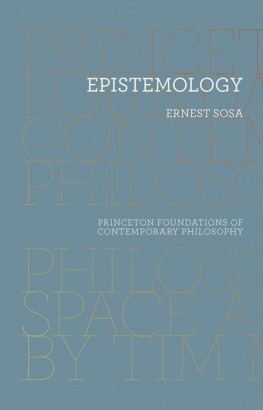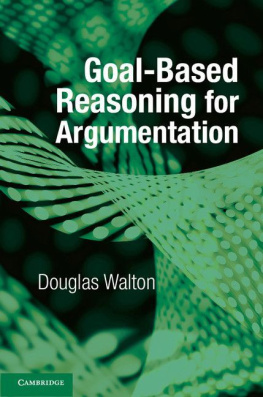Bishop, Michael A Associate Professor of Philosophy, Northern Illinois University
Trout, J. D. Professor of Philosophy and Adjunct Professor at the Parmly Hearing Institute, Loyola University Chicago

Epistemology and the Psychology of Human Judgment
Print ISBN 0195162293, 2005
doi:10.1093/0195162293.001.0001
Abstract: Abstracts and keywords to be supplied.
Epistemology and the Psychology of Human Judgment
end p.i
end p.ii
Abstract: Abstracts and keywords to be supplied.
Epistemology and the Psychology of Human Judgment
2005
end p.iii

Oxford New York
Auckland Bangkok Buenos Aires Cape Town Chennai
Dar es Salaam Delhi Hong Kong Istanbul Karachi Kolkata
Kuala Lumpur Madrid Melbourne Mexico City Mumbai Nairobi
So Paulo Shanghai Singapore Taipei Tokyo Toronto
Copyright 2005 by Oxford University Press, Inc.
Published by Oxford University Press, Inc.
198 Madison Avenue, New York, New York 10016
www.oup.com
Oxford is a registered trademark of Oxford University Press
All rights reserved. No part of this publication may be reproduced,
stored in a retrieval system, or transmitted, in any form or by any means,
electronic, mechanical, photocopying, recording, or otherwise,
without the prior permission of Oxford University Press.
Library of Congress Cataloging-in-Publication Data
Bishop, Michael A
Epistemology and the psychology of human judgment / Michael A Bishop, J. D. Trout.
p. cm.
Includes bibliographical references and index.
ISBN 0-19-516229-3; 0-19-516230-7 (pbk.)
1. Judgment. I. Trout, J. D. II. Title.
BF441 .B616 2004
121dc22 2004043889
9 8 7 6 5 4 3 2 1
Printed in the United States of America on acid-free paper
end p.iv
To our wives, Loretta Torrago and Janice Nadler,
and to the veritable basketball team we produced while writing this book:
Miguel Bishop Torrago 7/5/2000
Daniel Bishop Torrago 9/26/2001
Nicolas Bishop Torrago 3/19/2003
Jack Nadler 7/5/2000
Jessie Nadler 4/14/2004
Miguel and Jack, our first children, were born on the same day. Our actuarial outlook counsels that this is an unimpressive coincidence. But really, what are the chances?
end p.v
end p.vi
Preface
This book began in our classrooms. At some point, we discovered that we both teach critical thinking courses that are idiosyncratic in the same waysin short, as though they are courses in the psychology of judgment. For example, we both had our students read Robyn Dawes's
House of Cards (1994) and Thomas Gilovich's
How We Know What Isn't So (1991). We independently arrived at the idea that there were epistemological lessons to be drawn not just from the heuristics and biases tradition (which has received attention from philosophers) but also from the fascinating research on linear predictive modeling. But we also recognized that psychologists for too long had been wrestling with normative, epistemic issues with much too little useful input from philosophers. In their classic book
Human Inference: Strategies and Shortcomings of Social Judgment (1980), Richard Nisbett and Lee Ross call for greater participation from philosophers in tackling the normative issues that arise in psychology.
[W]e have become increasingly aware of the difficulty of defining what is "normative" when one moves beyond the relatively simple question of how to solve correctly some particular problem. "Normatively appropriate" strategies for the solution of some problems are extremely time consuming and expensive. It may be clear what must be done if one wishes a correct answer to such problems, but sometimes it may be even clearer that the correct solution is not worth the effort. This gives rise to more important questions of normativeness which are not fundamentally empirical in nature: How much effort, for what kinds of problems, should be expended to obtain a correct solution?
end p.vii
We have become excited by such normative questions and are pleased that our book highlights them. We have not been able to make much progress toward their solution, however. It is our hope that others, particularly philosophers who are more comfortable with such questions, will be motivated to pursue them. (, 13-14)
It is rare for scientists to call on philosophers to contribute in substantive ways to their scientific projects. Rarer still for scientists who are at the top of their field.
Armed with the suspicion that there was something useful for philosophers to do in this area, we organized a symposium at the 2000 Philosophy of Science Association meeting in Vancouver. The purpose of the symposium was to explore the connections between research on predictive modeling and philosophy (see ). We have also presented these ideas to a number of audiences at Bryn Mawr College, California State University at Long Beach, Howard University, Northwestern University, University of Illinois, University of Innsbruck, University of Utah, and Washington University in St. Louis. In almost every venue, there were philosophers whose reaction to these issues was similar to our own: the normative issues raised by the psychological literature are interesting and important, but analytic epistemology does not have the resources to adequately address them. So we sat down to write this book.
Our goal in this book is to bring whatever philosophical expertise we can to bear on the sorts of normative issues that bedevil psychologists (like Nisbett and Ross). With a few notable exceptions, the normative concerns of epistemologists and psychologists have inhabited different intellectual worlds. When philosophers do discuss psychological findings, it is usually to dismiss them as irrelevant to epistemology. This book will have achieved its goals if it leads at least some philosophers and psychologists to admit (even if ever so grudgingly) that their field of study would benefit from closer cooperation with their sister discipline.
This book is the product of somewhat unusual philosophical training. But then again, our philosophy teachers were an unusual collection of curiosity, talent, and trust. We are grateful to Richard Boyd, Philip Kitcher, Robert Stalnaker, and Stephen Stich, each of whom taught us in his own way the value of pursuing interesting but risky projects. They also encouraged us to explore issues that lie outside the disciplinary confines of philosophy. In so doing, we were lucky to learn psychology, in graduate school and after, from Frank Keil, Richard Nisbett, David Pisoni,
end p.viii
V. S. Ramachandran, Robert Remez, Roger Shepard, and Gary Wells. These psychologists instilled in us an appreciation for a science of the mind and (probably unwittingly) a recognition of its relevance to philosophical questions.
Given our general outlook, we doubt that we can very reliably identify the most important intellectual influences on our epistemological views. But we are confident that they include Richard Boyd's "Scientific Realism and Naturalistic Epistemology" (1980), Alvin Goldman's "Epistemics: The Regulative Theory of Cognition" (1978) as well as







 Epistemology and the Psychology of Human Judgment
Epistemology and the Psychology of Human Judgment
